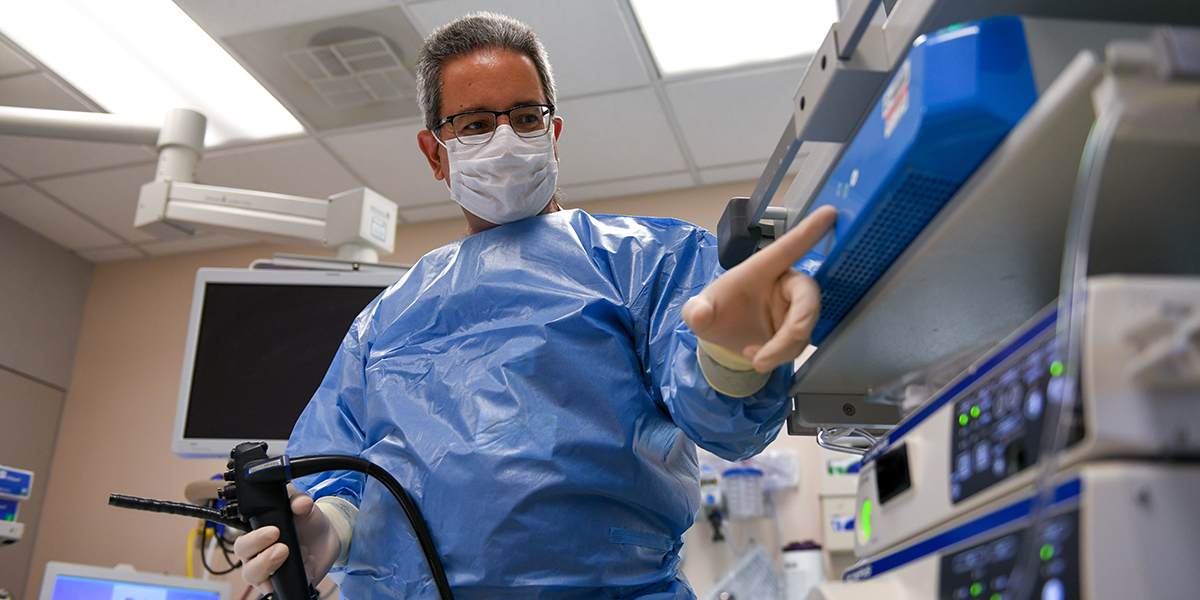Hackensack University Medical Center Pancreatobiliary Program Launches Successful Pancreatic Cancer Screening Initiative Doubling Diagnosis Rate
Proactive biomarker testing and efficient collaboration yield earlier diagnosis and higher survival rates

When the first biomarker blood screening tests for pancreatic cancer became available, Hackensack University Medical Center gastroenterologist Rosario J. Ligresti, M.D., saw a huge opportunity to formalize the Center’s cross-specialty pancreatic and biliary care approaches and change pancreatic cancer outcomes for the better.
Now in its third year, the Center’s Pancreatobiliary Program, led by Dr. Ligresti, embraced the new blood test tool and leveraged the network-wide electronic medical record, becoming New Jersey’s first care provider to adopt a more proactive screening protocol incorporating the newly available blood tests.
Because pancreatic cancer is often asymptomatic while up to 10 years of genetic changes occur—changes that the new biomarker blood test can help detect—the cancer that was once rarely diagnosed at an early stage now is getting diagnosed at a stage when surgical treatment is feasible.
Dr. Ligresti identified certain populations in which routine screening for pancreatic cancer is effective, including those with BRCA gene mutations and new onset diabetes diagnoses. One in four individuals diagnosed with pancreatic cancer was diagnosed with diabetes prior, while individuals with the BRCA gene have up to an eight times higher risk for pancreatic cancer, Dr. Ligresti said. The new screening approach has doubled the center’s pancreatic cancer diagnosis rate. The program team also is identifying a majority of cases at stage one, versus 40% prior to the screening program’s initiation.
Patients are followed annually with blood testing and MRI, and specialized endoscopy is employed in positive cases for further evaluation.
In addition to managing the new pancreatic screening program, the Pancreatobiliary Program formalizes multidisciplinary collaboration across surgery, oncology, radiation and gastroenterology. The team holds a weekly multidisciplinary tumor board to discuss pancreatobiliary cancers and a nurse navigator helps ensure smooth care experience and access across specialties.
The team also manages care for other GI issues involving the pancreas and bile ducts, and Hackensack University Medical Center is a referring center for complex pancreatic disease due to its high volume and vast experience managing such cases.
The center is participating in clinical trials as well, including PRECEDE, a multinational, longitudinal study on early detection of pancreatic cancer, which is gathering cohort data to help determine the most effective screening biomarker to detect pancreatic and biliary cancers. The team also participated in the GRAIL PATHFINDER trial, with results published in Lancet showing that biomarker screening can shorten the time to cancer diagnosis to less than three months in at-risk patients.
The program also brings advanced endoscopy techniques into clinical care, including high-frequency ultrasound combined with endoscopy (EUS) for the best possible imaging of the pancreas and application of AI during imaging studies to help identify early-stage tumor patterns. Spyglass imaging technology allows the team to even view inside bile ducts and perform biopsies, a part of the gastrointestinal tract that previously had never been accessed.
Hackensack University Medical Center was the first National Pancreas Foundation Center of Excellence in New Jersey.
Learn more about innovations in gastroenterology and our advanced endoscopy program at Hackensack University Medical Center.
